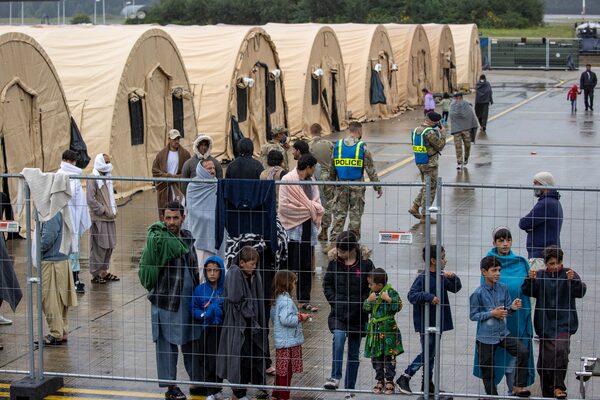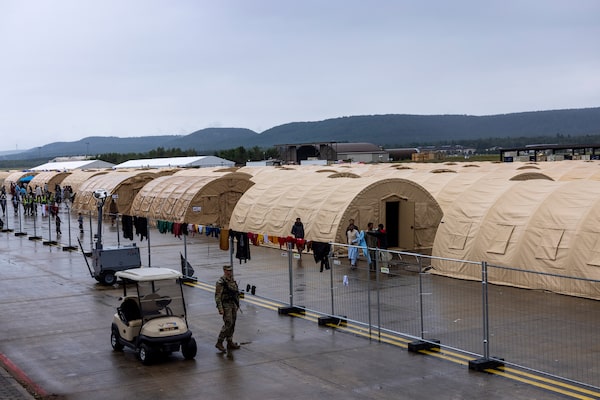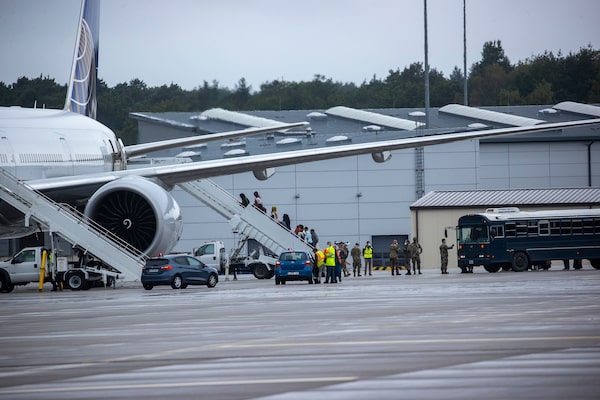
Many evacuated Afghan refugees have been temporarily sheltered at Ramstein U.S. Airbase in western Germany. It’s become the largest reception centre within the U.S. European Command for the military airlift codenamed Operation Allies Refuge.Photography by Alex Kraus/The Globe and Mail
Hundreds of exhausted Afghans, the lucky ones who managed to get onto American evacuation flights out of Kabul, crowd into a hangar at a U.S. air base in Germany in a sombre scene of how the Taliban takeover of their homeland has upended so many lives.
Ramstein Air Base in western Germany first began receiving Afghan evacuees on Aug. 20, and since then it’s become the largest reception centre within the U.S. European Command for the military airlift codenamed Operation Allies Refuge. As of Monday morning, about 100 U.S. Air Force flights had landed at the base, bringing in some 23,000 evacuees. Another 1,700 were expected during the day, as the U.S. ended the airlift and withdrew its final troops from Afghanistan.
More than 8,000 evacuees have already left Germany on the next steps of their journeys toward resettlement. Before boarding one of 38 flights, each person went through an extensive security and screening process.
But for those Afghans still in transit at Ramstein Air Base, uncertainty remains. At the base, officials make sure evacuees have somewhere to sleep, are fed and safe. More than 400 beige military tents line the grounds in rows. Evacuees are also sheltering in nearby airport hangars.
Even in the cool rain this weekend, people walked between the tents, with blankets draped around their shoulders. A little girl took cover in a massive blue IKEA bag.

More than 400 beige military tents line the grounds in rows at Ramstein. Evacuees are also sheltering in nearby airport hangars.

Children continued to play inside Ramstein, throwing a ball over the fence to U.S. service members, who were keen to keep the game going.
Within a fenced-off area inside one of the base’s hangars, hundreds of Afghans waited for their flights out of Germany. Children continued to play, throwing a ball over the fence to U.S. service members, who were keen to keep the game going. Adults and teens sat in the hangar, drained from their journeys so far and not clear about what came next. Many didn’t know when their flights would leave but said they were eager to go.
The Afghans who spoke with The Globe and Mail were grateful that they were evacuated safely, but incredibly sad to leave their homes and desperately worried about family and friends who did not manage to make it out of the Taliban-ruled country.
From inside the hangar where he was waiting for his flight, Bunyad Mushakhas said he, his wife and eight-year-old son were glad they have been evacuated, but that leaving home felt awful, particularly knowing his friends had been left behind.
Mr. Mushakhas, 32, said he worked as a translator for the U.S. embassy in Kabul and that most of his colleagues were trapped in the city. “I miss my home. … We had a very happy life there, but the Taliban came,” he said. “We have to move to the United States; we’re happy for the United States but in our homeland, we were very happy.”
Mr. Mushakhas said he was urging the U.S. military to help his colleagues, saying: “They’re in danger. … They’re hiding in their homes.”

Bunyad Mushakhas, his wife and their eight-year-old son were evacuated.
Elizabeth Horst, senior interagency co-ordinator at Ramstein, told reporters that American officials are on a mission “to get our American citizens back to the United States; another important part of our mission is to help get our Afghan friends who worked with us for 20 years in Afghanistan safely through the United States.”
The “Herculean” task of turning the base into a massive evacuation centre and taking care of thousands of people was taking an emotional toll, said U.S. Brigadier-General Josh Olson. That was especially the case, he said, since the base received U.S. Marines, both injured and killed, after a suicide bomber and gunmen attacked Kabul’s airport on Thursday.
“Seeing those soldiers come off that aeromedical evacuation plane, it’s a heavy burden. Seeing little babies that are tired, that are crying, that are hungry, that are weary, that’s a heavy burden. … It is a joint effort of a magnitude that we don’t even understand.”

Injured Marines from the Kabul attack were treated at Landstuhl Regional Medical Center, not far from Ramstein.
Gen. Olson said injured Marines from the Kabul attack were being treated at Landstuhl Regional Medical Center, not far from the base. “I actually got to talk to the Marines that are here; they’re doing well and good news is that they were stabilized,” he said. When asked if wounded Afghans were also brought to the base, Gen. Olson said: “We brought a lot of wounded here and we’re caring for all the wounded that comes to us. Our focus is taking care of everybody.”
Officials at the base were sensitive to an agreement with Germany, which stipulated that Afghans could stay up to 10 days on the base, Gen. Olson said.
Another challenge U.S. officials faced was reuniting unaccompanied minors with their parents or guardians. Andy Halus, a spokesperson for the U.S. consulate general in Frankfurt, said they were working with international partners to determine how to identify unaccompanied minors and how to best protect them. “That is a priority of ours, because we want to reunite families,” he said.

Omid Faizy, 29, told the Globe and Mail that he arrived in Washington via Ramstein U.S. Airbase in Germany.
Omid Faizy, who spoke to The Globe in the airport hangar on Saturday, said in a message on Sunday that he had arrived to Washington. The day before, the 29-year-old said he was feeling good but “not good about my country.”
“Everything’s gone down,” he said, adding that he was with his wife and brother. Mr. Faizy said he was part of a group of about 30 families with relatives who worked for the U.S. embassy in Kabul. But his family remained behind.
“My whole family is left in Afghanistan. My father, mother, brothers and my home, everything,” he said.
Still, he had to leave. He said the Taliban knew he worked at the U.S. embassy and would have killed him if he stayed.

Mr. Faizy said he was part of a group of about 30 families who worked for the U.S. embassy in Kabul. His family, however, remained behind in Afghanistan.
Our Morning Update and Evening Update newsletters are written by Globe editors, giving you a concise summary of the day’s most important headlines. Sign up today.
 Janice Dickson
Janice Dickson